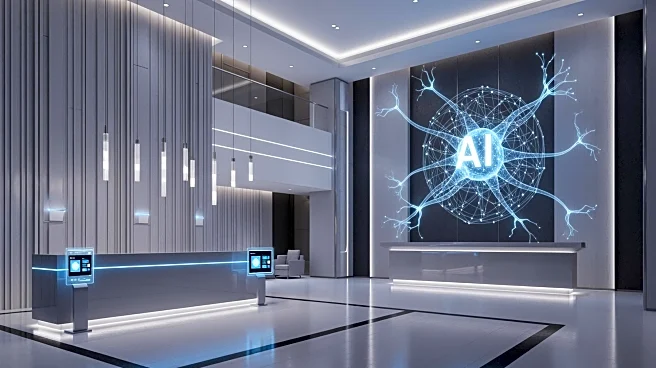What's Happening?
Mews, a leading hospitality operating system, has released a report detailing the transformative potential of agentic AI in hotel operations. The report, titled 'Agentic AI for Hotels: The Mews Vision
for AI in Hospitality,' outlines how intelligent agents will reshape the industry by autonomously coordinating across revenue, operations, and guest services. Unlike traditional automation, agentic AI connects multiple hotel systems to reason, plan, and act autonomously, enhancing efficiency and guest satisfaction. Mews emphasizes that while AI will take on more orchestration, hoteliers will remain in control, ensuring the human touch remains central to hospitality. The report highlights the convergence of factors such as advances in large language models and open platforms that make this transformation inevitable.
Why It's Important?
The introduction of agentic AI in hospitality represents a significant shift towards more efficient and personalized hotel operations. By automating routine tasks, AI allows hotel staff to focus on enhancing guest experiences, potentially increasing customer satisfaction and loyalty. This technological advancement could lead to improved profitability for hotels by optimizing rates and distribution based on real-time data. Furthermore, the integration of AI systems can streamline operations, reduce costs, and provide a competitive edge in the increasingly complex hospitality market. As AI becomes more prevalent, hotels that adopt these technologies may see substantial benefits in operational efficiency and guest engagement.
What's Next?
Mews is fast-tracking the development of autonomous and semi-autonomous agents across various hotel functions, building on advancements in conversational intelligence and semantic modeling. The company plans to integrate DataChat's technology to strengthen its AI capabilities. As the industry moves towards AI-first operating systems, hotels will need to adapt to these changes by gradually adopting AI technologies. This transition will require careful planning to ensure that AI systems are implemented safely and effectively, maintaining the balance between technology and human interaction. The report provides a roadmap for hotels to adopt agentic AI, emphasizing the importance of a unified data model for accurate decision-making.
Beyond the Headlines
The shift towards agentic AI in hospitality raises ethical and cultural considerations regarding the balance between technology and human interaction. While AI can enhance efficiency, it is crucial to ensure that the human element of hospitality is not lost. The industry must navigate the potential challenges of AI integration, such as data privacy concerns and the need for continuous learning and adaptation. Additionally, the role of AI in hospitality may influence long-term shifts in workforce dynamics, requiring new skills and training for hotel staff to work alongside intelligent systems.









